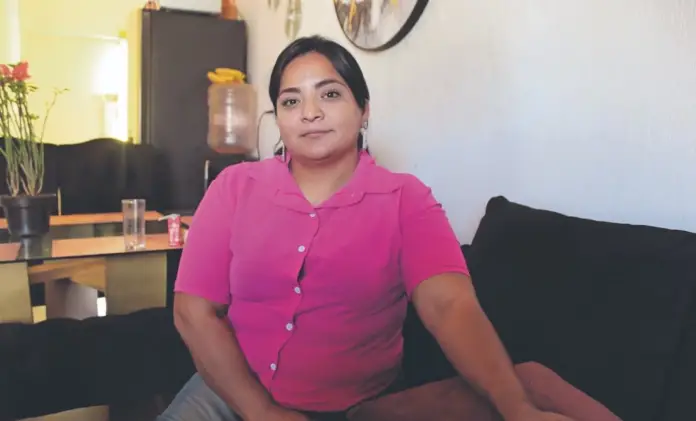One day, Mónica Esparza’s daughter arrived home with blisters on her feet. She was returning from a school project. Mónica, her mother, didn’t have money to pay for the bus.
That day, Mónica Esparza, who was a victim of torture by Torreón police, decided she would fight for reparations, which she had initially rejected because she wanted to bury everything related to the government.
What She Had to Go Through
Twelve years ago, on February 12, 2013, Torreón police detained her, her husband, and her brother. What she initially thought would be a routine arrest ended in hell: they were taken to a warehouse where they were physically and sexually tortured for more than 10 hours.
During the physical violence, her husband, Alfredo Domínguez, died. Later, she and her brother were accused of kidnapping and possession of weapons for the exclusive use of the Army, for which they remained in prison for seven years until Mónica decided to fight for her freedom.
Along the way, another of her brothers was murdered in an attempt to stop Mónica from fighting for her freedom. In 2020, she was released from prison.
The National Human Rights Commission (CNDH) had issued recommendation 15/2016 for the case of illegal detention, torture, sexual violence, and arbitrary execution.
“I didn’t want anything, but I had many things: a boutique, a cyber cafe. They took all of that away from me. Sometimes we give one meal a day. I feel I have to fight for my daughters, and for my brother who was killed. He lost his life because I fought for my freedom,” she says.
Repairing the Damage
The road has not been easy. Five years after obtaining her freedom, she has not been able to get the authorities to restore what she lost.
The CNDH issued seven recommendations to the governor of Coahuila and the city council of Torreón, including the need to repair the damage in accordance with the state’s Victims’ Law.
To date, Torreón city council authorities have not resolved anything; while the Coahuila Executive Commission for Victim Assistance (CEAV) is making slow progress.
In fact, Mónica Esparza, who is about to turn 38, says that since 2021, she has been undergoing an “impact interview” to assess the damages suffered: “the before and after,” because they argued that it was difficult to quantify the damage financially. To this day, the CEAV has not been able to establish a monetary amount that the municipality should cover.
“They told me that by the end of January, they would have the amount, [then] that by February we would start everything. They took away my lawyer and stopped answering me,” Mónica says.
Her lawyer, from the Executive Commission for Victim Assistance, told her that she could no longer represent her because she would be in charge of heading the Comprehensive Aid, Assistance, and Reparation Fund, which victims of crimes and rape can access.
“They tell me that the moment the municipality tells me they don’t have the money to pay me, I’m going to demand that the CEAV pay me. And since they’re going to tell me they don’t have the money, that’s why this decision was made. They’re already anticipating it, that they’re going to tell me they don’t have the money to pay me,” said the victim of abuse of authority.
She won’t give up
Mónica Esparza went to the city of Saltillo and tried to speak with the new head of the CEAV, Ricardo Martínez Loyola, who took office just last December, but she didn’t receive her. EL UNIVERSAL also sought him out, but as of press time, there was no response.
Mónica assures that she won’t give up. She reiterates and emphasizes that she owes it to her daughters. “I made a lot of sacrifices so they could keep everything,” she says. “I have no choice but to fight for what’s mine. I’m not asking for more.”
She knows that the years she was unjustly detained will not be returned to her. She would like at least help starting a business.
“What I want is to start. I want some assets to support myself because I can’t settle down,” Mónica demands.
Her dream before being detained, tortured, and living in prison was to become a boutique entrepreneur. She owned a boutique and an internet cafe. All she has left of those is a memory.
Another recommendation from the CNDH was to follow up on the criminal and administrative proceedings against the six police officers who initiated the arrest on February 12, 2013. However, to date, no one has been jailed for the arbitrary detention or torture.
She says that two of the police officers who arrested her were arrested a year ago. But a judge ruled to release them without even charging them with legal action. At that time, they were still working for the Municipal Police.
Perhaps because of the situation she experienced, her dream now, in addition to fighting for full reparation, is to become a lawyer.
“I believe it’s never too late to do things. When I was in prison, I met many innocent people. I want to set an example for my daughters. It’s always possible. All I’ve ever wanted is to be happy with my family,” she says.

Source: eluniversal




